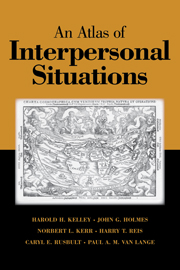Book contents
- Frontmatter
- Contents
- Preface
- PART ONE INTRODUCTION AND THEORY
- PART TWO THE SITUATIONS
- Single-Component Patterns
- Two- and Three-Component Patterns
- Entry #5 The Prisoner's Dilemma: Me versus We
- Entry #6 Threat: Trading Loyalty for Justice
- Entry #7 Chicken: Death before Dishonor
- Entry #8 Hero: Let's Do It Your Way
- Entry #9 Conjunctive Problems: Together We Can Do It
- Entry #10 Disjunctive Problems: Either of Us Can Do It
- Entry #11 Asymmetric Dependence: You're the Boss
- Time-Extended Patterns
- Incomplete Information Situations
- N-Person Situations
- Movement from One Situation to Another
- PART THREE EPILOGUE
- References
- Author Index
- Subject Index
Entry #5 - The Prisoner's Dilemma: Me versus We
Published online by Cambridge University Press: 21 October 2009
- Frontmatter
- Contents
- Preface
- PART ONE INTRODUCTION AND THEORY
- PART TWO THE SITUATIONS
- Single-Component Patterns
- Two- and Three-Component Patterns
- Entry #5 The Prisoner's Dilemma: Me versus We
- Entry #6 Threat: Trading Loyalty for Justice
- Entry #7 Chicken: Death before Dishonor
- Entry #8 Hero: Let's Do It Your Way
- Entry #9 Conjunctive Problems: Together We Can Do It
- Entry #10 Disjunctive Problems: Either of Us Can Do It
- Entry #11 Asymmetric Dependence: You're the Boss
- Time-Extended Patterns
- Incomplete Information Situations
- N-Person Situations
- Movement from One Situation to Another
- PART THREE EPILOGUE
- References
- Author Index
- Subject Index
Summary
Examples
Perhaps the best-known interdependence situation is the Prisoner's Dilemma, a situation that derives its name from the classic anecdote about two prisoners who were accused of robbing a bank. In this anecdote, described in Luce and Raiffa (1957), the district attorney, unable to prove that they were guilty, created a dilemma in an attempt to motivate the prisoners to confess to the crime. The prisoners were put in separate rooms, where each prisoner was to make a choice: to confess or not to confess.
The district attorney sought to make confessing tempting to the prisoners by creating a situation in which the sentence was determined not only by their own confessing or not but also by the fellow prisoner's confessing or not. Yet irrespective of the fellow prisoner's choice, the choice to confess yielded a better outcome (or less worse outcome) than did the choice not to confess. Specifically, when the other confessed, confessing yielded “only” an 8-year sentence, whereas not confessing yielded a 10-year sentence. And when the other did not confess, confessing yielded only a 3-month sentence, whereas not confessing yielded a 1-year sentence. So, from this perspective, it seems rational for each prisoner to confess to the crime. However, the crux of the dilemma is that the outcome following from both confessing (an 8-year sentence) is worse than the outcome following from both not confessing (a 1-year sentence).
- Type
- Chapter
- Information
- An Atlas of Interpersonal Situations , pp. 177 - 191Publisher: Cambridge University PressPrint publication year: 2003



